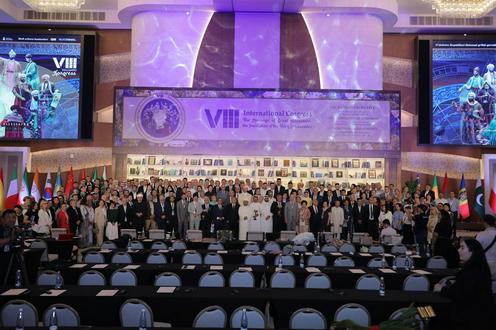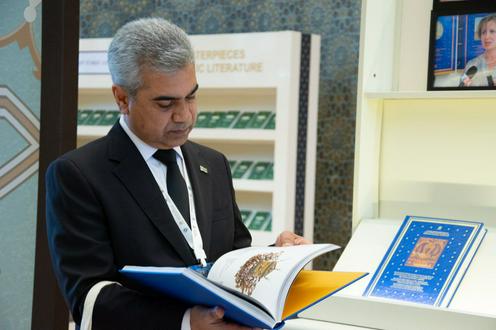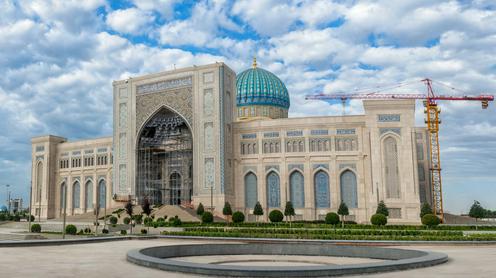From September 23 to 26, 2024, Tashkent and Samarkand hosted the 8th International Congress of the World Society for the Study, Preservation, and Popularization of Uzbekistan's Cultural Heritage (WOSCU). For the first time in its history, the Congress collaborated closely with the Center for Islamic Civilization of Uzbekistan, focusing on religious themes.
The Congress, supported by ERIELL Company, traditionally showcases new volumes from the «Cultural Heritage of Uzbekistan in World Collections» series. However, this year's event centered on the museum exhibitions of the Center for Islamic Civilization in Tashkent and the Imam Al-Bukhari complex in Samarkand.
The Center for Islamic Civilization, a grand edifice near the historic Hazrati Imam complex, was initiated by Uzbekistan's President Shavkat Mirziyoyev. It embodies the idea of enlightened Islam as a religion of peace, goodwill, and tolerance, as expressed by Mirziyoyev at the UN.
Alexander Wilhelm, Vice President of Marketing and Development at Mueller&Schindle publishing house, believes the Center and WOSCU will be powerful tools in promoting Uzbek and Islamic cultures.
The Congress participants, including about 300 scholars from 35 countries, discussed the concept of these museums, sharing ideas and experiences. The event also featured presentations of new projects, including the «114 Qurans» initiative and new volumes of the «Cultural Heritage of Uzbekistan in World Collections» series.
Firdavs Abduhalikov, Director of the Center for Islamic Civilization and WOSCU Board Chairman, emphasized the Center's role as a platform for science, culture, education, and enlightenment.
The Congress concluded with the adoption of the Samarkand Declaration, recognizing President Mirziyoyev's initiatives in creating the Center for Islamic Civilization. The declaration stressed the importance of the President's ideas about the truly humanistic and educational essence of Islam, calling for unity around this large-scale project to open new opportunities for international cooperation.
This Congress marked a significant step in promoting understanding of Islamic culture and heritage, emphasizing the role of enlightenment in combating ignorance and fostering international collaboration.
The Congress also featured a forum of the international cultural organization TURKSOY, adding to the event's significance.
One of the key presentations was the «Qurans of Uzbekistan» project, showcasing ancient Qurans from different eras now stored in museums worldwide. Alexander Wilhelm presented several pages from the upcoming book-album, including a unique modern Quran created for the Kingdom of Morocco, fitting the entire text on a single page.
Professor Halit Eren from Namik Kemal University presented copies of 10 Qurans related to Uzbekistan and stored in Turkish libraries. The Congress also introduced projects such as «The Holy Quran of Uzbek Khan,» «250 Qurans of Uzbekistan,» and a new Uzbek translation of the Quran.
A significant portion of the Congress was dedicated to the «Islam — Religion of Peace and Tolerance» project, discussing the creation of a film and book-album on «Enlightened Islam» with participation from leading Islamic centers and international organizations.
The event saw the presentation of 10 new volumes (71-80) of the «Cultural Heritage of Uzbekistan in World Collections» series, with contributions from scholars in Denmark, Germany, Russia, the UK, and Uzbekistan. Additional volumes (81-90) were also introduced, featuring work from researchers in Egypt, Pakistan, Greece, and Uzbekistan.
International collaborations were highlighted, including a joint project with museums in South Korea, North Korea, China, and the UAE, as mentioned by Sergey Laptev from Japan's Miho Museum.
The Congress also addressed the «Outstanding Personalities in the History of Uzbekistan» project and saw the signing of memorandums for various initiatives, including the translation of Frederick Starr's book «Rivals in Mind, 1000 AD: How Biruni and Ibn Sina Created Their Own Renaissance» into Uzbek.
The event concluded with the awarding of WOSCU's «Golden Book» prize to several distinguished scholars and the adoption of the Samarkand Declaration, emphasizing the importance of President Mirziyoyev's initiatives in promoting Islamic civilization and culture.
This Congress not only showcased Uzbekistan's rich cultural heritage but also emphasized the country's role in promoting a peaceful and enlightened understanding of Islam on the global stage.
The Congress also served as a platform for international scholars to share their research and collaborate on future projects. For instance, Nuria Garaeva from the Institute of Language, Literature and Art of the Tatarstan Academy of Sciences presented on masterpieces of Uzbekistan's manuscript heritage in Tatarstan collections.
Ekaterina Ermakova from Moscow's Museum of the East proposed that the Center for Islamic Civilization could become a unique exhibition platform for Islamic art, suggesting themed exhibitions based on Quranic imagery and Islamic art concepts.
The event also saw the participation of Sandro Teti, president of the Italian publishing house Sandro Teti Editore, who presented a new Italian translation of Babur's famous «Baburnama.» Teti expressed interest in organizing a WOSCU Congress in Italy to leverage the expertise of Italian Turkologists and specialists in modern Uzbek language.
A significant aspect of the Congress was its focus on educational initiatives. The «Enlightenment Against Ignorance» theme was prominent throughout the event, with discussions on new approaches to popularizing Islamic spiritual heritage. This aligns with Uzbekistan's broader efforts to promote a moderate and enlightened understanding of Islam.
The Congress also highlighted the importance of digital technologies in preserving and promoting cultural heritage. Several presentations showcased the use of modern technology in archiving, studying, and presenting historical artifacts and manuscripts.
Frédéric-Beaupertuis Bressand, founder and president of the Temurid Association in France, praised the Congress for its role in demonstrating the peaceful nature of Islam in Uzbekistan. He emphasized the importance of showcasing Uzbekistan as a country of tolerance and peaceful Muslim perception.
The event concluded with a call for scholars, researchers, cultural representatives, and the public to unite around the large-scale project of promoting enlightenment and combating ignorance. This initiative, as outlined in the Samarkand Declaration, is seen as a crucial step towards strengthening peace and cooperation on a global scale.
Overall, the 8th International WOSCU Congress demonstrated Uzbekistan's commitment to preserving its rich cultural heritage while promoting a message of peace, tolerance, and enlightenment through the lens of Islamic civilization. The event's success underscores the growing international interest in Central Asian cultural studies and the potential for further collaboration in this field.
The Congress also addressed the challenges of preserving and promoting cultural heritage in the digital age. Several presentations explored innovative ways to engage younger generations with historical and cultural content, including interactive exhibitions and virtual reality experiences.
The event highlighted the importance of cross-cultural dialogue and understanding. Discussions emphasized how the study of Islamic civilization can contribute to global peace and mutual respect among different cultures and religions.
Participants also explored the economic potential of cultural heritage tourism. They discussed strategies for sustainable development of historical sites and the role of cultural tourism in local economies.
The Congress paid special attention to the contributions of women scholars in Islamic civilization, highlighting often overlooked historical figures and their impact on science, literature, and art.
Environmental concerns were also addressed, with discussions on the preservation of historical sites in the face of climate change and the need for sustainable conservation practices.
The event concluded with a series of recommendations for future research and collaboration. These included proposals for joint research projects, student exchange programs, and the establishment of a digital platform for sharing resources among scholars worldwide.
Participants left the Congress with a renewed sense of purpose and a shared commitment to the preservation and promotion of Uzbekistan's cultural heritage. The success of the event underscored Uzbekistan's growing role as a center for Islamic studies and cultural preservation in Central Asia.
As the Congress came to a close, organizers announced plans for the next gathering, promising to build on the successes and insights gained from this year's event. The 8th International WOSCU Congress will be remembered as a milestone in the ongoing effort to bridge cultures, promote understanding, and preserve the rich tapestry of human heritage.
-
 24 December24.12To Clean Up and to ZIYAWhat China Can Offer Central Asia in the “Green” Economy
24 December24.12To Clean Up and to ZIYAWhat China Can Offer Central Asia in the “Green” Economy -
 23 December23.12PhotoTokyo DriveJapan to invest about $20 billion in projects across Central Asia over five years
23 December23.12PhotoTokyo DriveJapan to invest about $20 billion in projects across Central Asia over five years -
 17 December17.12Sake for SixCentral Asia’s Rapprochement with Japan Comes with Hidden Pitfalls
17 December17.12Sake for SixCentral Asia’s Rapprochement with Japan Comes with Hidden Pitfalls -
 17 December17.12Gulshan Is the BestYoung Uzbek Karateka Becomes World Champion
17 December17.12Gulshan Is the BestYoung Uzbek Karateka Becomes World Champion -
 24 November24.11Here’s a New TurnRussian Scientists Revive the Plan to Irrigate Central Asia Using Siberian Rivers
24 November24.11Here’s a New TurnRussian Scientists Revive the Plan to Irrigate Central Asia Using Siberian Rivers -
 11 November11.11To Live Despite All HardshipUzbek filmmaker Rashid Malikov on his new film, a medieval threat, and the wages of filmmakers
11 November11.11To Live Despite All HardshipUzbek filmmaker Rashid Malikov on his new film, a medieval threat, and the wages of filmmakers






